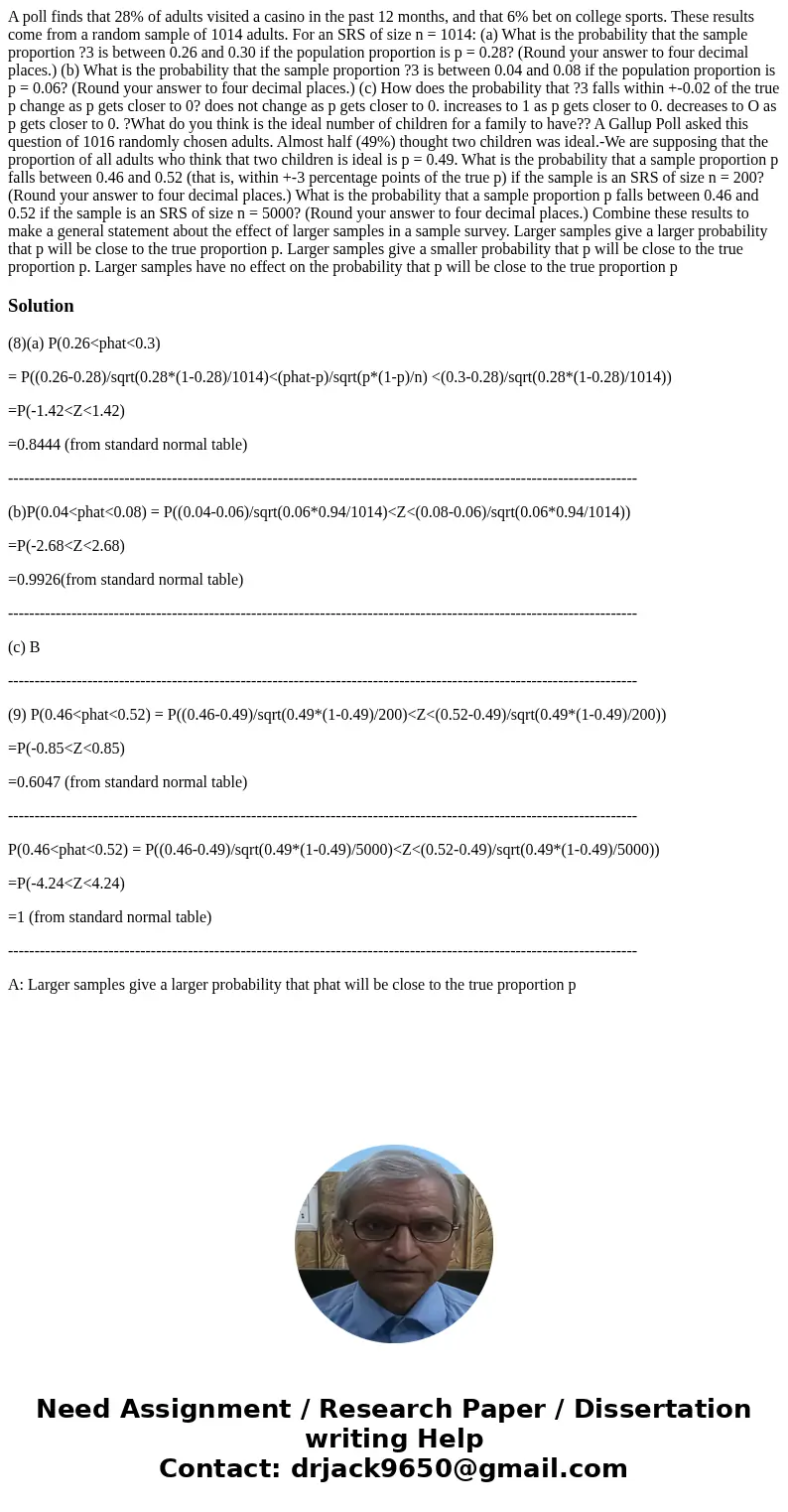A poll finds that 28% of adults visited a casino in the past 12 months, and that 6% bet on college sports. These results come from a random sample of 1014 adults. For an SRS of size n = 1014: (a) What is the probability that the sample proportion ?3 is between 0.26 and 0.30 if the population proportion is p = 0.28? (Round your answer to four decimal places.) (b) What is the probability that the sample proportion ?3 is between 0.04 and 0.08 if the population proportion is p = 0.06? (Round your answer to four decimal places.) (c) How does the probability that ?3 falls within +-0.02 of the true p change as p gets closer to 0? does not change as p gets closer to 0. increases to 1 as p gets closer to 0. decreases to O as p gets closer to 0. ?What do you think is the ideal number of children for a family to have?? A Gallup Poll asked this question of 1016 randomly chosen adults. Almost half (49%) thought two children was ideal.-We are supposing that the proportion of all adults who think that two children is ideal is p = 0.49. What is the probability that a sample proportion p falls between 0.46 and 0.52 (that is, within +-3 percentage points of the true p) if the sample is an SRS of size n = 200? (Round your answer to four decimal places.) What is the probability that a sample proportion p falls between 0.46 and 0.52 if the sample is an SRS of size n = 5000? (Round your answer to four decimal places.) Combine these results to make a general statement about the effect of larger samples in a sample survey. Larger samples give a larger probability that p will be close to the true proportion p. Larger samples give a smaller probability that p will be close to the true proportion p. Larger samples have no effect on the probability that p will be close to the true proportion p
(8)(a) P(0.26<phat<0.3)
= P((0.26-0.28)/sqrt(0.28*(1-0.28)/1014)<(phat-p)/sqrt(p*(1-p)/n) <(0.3-0.28)/sqrt(0.28*(1-0.28)/1014))
=P(-1.42<Z<1.42)
=0.8444 (from standard normal table)
-----------------------------------------------------------------------------------------------------------------------
(b)P(0.04<phat<0.08) = P((0.04-0.06)/sqrt(0.06*0.94/1014)<Z<(0.08-0.06)/sqrt(0.06*0.94/1014))
=P(-2.68<Z<2.68)
=0.9926(from standard normal table)
-----------------------------------------------------------------------------------------------------------------------
(c) B
-----------------------------------------------------------------------------------------------------------------------
(9) P(0.46<phat<0.52) = P((0.46-0.49)/sqrt(0.49*(1-0.49)/200)<Z<(0.52-0.49)/sqrt(0.49*(1-0.49)/200))
=P(-0.85<Z<0.85)
=0.6047 (from standard normal table)
-----------------------------------------------------------------------------------------------------------------------
P(0.46<phat<0.52) = P((0.46-0.49)/sqrt(0.49*(1-0.49)/5000)<Z<(0.52-0.49)/sqrt(0.49*(1-0.49)/5000))
=P(-4.24<Z<4.24)
=1 (from standard normal table)
-----------------------------------------------------------------------------------------------------------------------
A: Larger samples give a larger probability that phat will be close to the true proportion p

 Homework Sourse
Homework Sourse